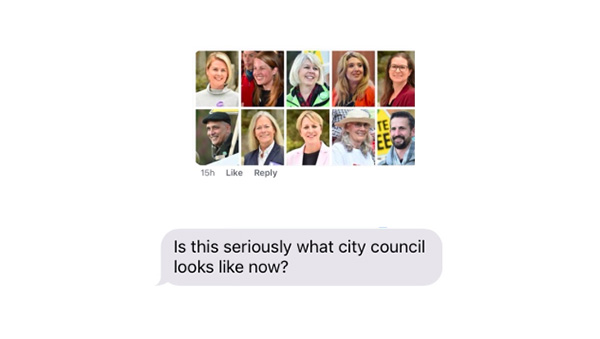Shortly after the election, a friend who is a dutiful voter, but usually unengaged with civic politics, sent me a photo of the new Vancouver city council with an accompanying text in disbelief on the lack of ethnic diversity*: “Is this seriously what city council looks like right now?”
Since then a slew of news articles and op-eds have been published on #CouncilSoWhite and whether it even matters.
On whether it matters, some critics like Terry Glavin say “there are more crucial issues than the colour of Vancouver’s council.” Others like Dr. Erin Tolley say that “diversity on council isn’t a matter of political correctness. It goes to the heart of representative democracy.... [T]he persistent homogeneity of municipal councils is of concern.”
Some diagnose it as a symptom of voter racism and discrimination towards candidates with non-Anglicized surnames. Others blame the “racist” at-large voting system or low voter turnout, and suggest solutions like changing the electoral system to a ward system.
Although each of these concerns and solutions have its own merits and critiques, all are also focused around the outcome of electoral results and the immediate inputs that influence it, namely the voting system, voter turnout and voters.
Instead, if we really wanted to address the ethnic diversity issue for municipal councils, we need to look upstream from the election for where things went wrong.
(*Note: I purposely chose the word “ethnic” as opposed to “race,” because it encompasses both race and culture. People of the same race can identify with different cultures based on their lived experiences, migration histories and other factors.)
An early filtering system
#CouncilSoWhite is a symptom, an accumulation of structural issues within politics-at-large. By the time a voter fills in their ballot, candidates have already been filtered extensively by actors and processes within the political system.
For example, political parties and their nomination processes are key filters. Of the parties elected this election, the majority of all of their candidates were white, which already introduced ethnic bias to the pool of candidates considered “viable” to voters at the outset.
The composition of party directors, members and donors is opaque, but one just needs to scan photos of party gatherings online to quickly observe the ethnic homogeneity of the political parties with elected councillors.
This is not to say that people only nominate others who are of their same ethnicity, but the ethnic composition of a group is telling of who is included and therefore will feel welcomed to participate.
Polling also plays a big factor in elections. If polling is offered in English only, it can bias who is sampled for opinion, ultimately impacting which candidates are highlighted and therefore legitimized in the media.
Outside of the immediate candidate selection processes, we also need to understand how people get politicized in the first place. Voting is arguably the most basic form of civic engagement.
Politicize through inclusion
One way to get people out to vote is by reaching out to them, but politicians and their operatives are arguably failing on this most basic task.
Take for example, the current proportional representation referendum and a Get Out The Vote campaign that aims to mobilize voters on a particular position. The appointed pro proportional representation campaign, Vote PR BC, has done little to no direct outreach to ethnic groups despite their budget of half a million dollars.
If ethnic groups are deliberately ignored by the political class on a vote about something as fundamental as our electoral system, then how can they engage in the ongoing political process come election time?
A higher touch opportunity to engage with the political system is by participating in civic advisory committees. When I was serving as an appointed member of the Arts and Culture Policy Council for the City of Vancouver not too long ago, I was one out of three people of colour in a mostly white advisory body of almost a dozen.
The excuse for the lack of diversity was that there were simply not enough people of colour applying for the positions, when in fact the City makes little effort to recruit more diverse candidates in the first place.
Another way to become politicized is by participating in civic processes, such as public hearings and public input opportunities. On any given public hearing or open house, most attendees are noticeably white. Many citizen and neighbourhood groups that the City consults with are also very white in membership and leadership.
When people of colour who are non-English speakers try to engage with the City, they are met with further hurdles like language barriers. This could subsequently influence the political and civic engagement of first generation immigrant ethnic families and whether their children become politically active in the future.
These are just some of the structural issues within and outside civic institutions that filter people out of political engagement right at the start.
It is easy for critics of #CouncilSoWhite to prescribe simple election-focused solutions like changing the electoral system to a ward system or designating a civic diversity and inclusion committee.
But if we earnestly want a council that is more ethnically diverse and doesn’t tokenize people of colour, then we need to re-evaluate status quo and change all parts of the political and civic engagement ladder to be more inclusive to people of colour.
Otherwise, by the time we mark our ballots for our favourite candidates, it is already too late. ![]()
Read more: Rights + Justice, Municipal Politics
















Tyee Commenting Guidelines
Comments that violate guidelines risk being deleted, and violations may result in a temporary or permanent user ban. Maintain the spirit of good conversation to stay in the discussion.
*Please note The Tyee is not a forum for spreading misinformation about COVID-19, denying its existence or minimizing its risk to public health.
Do:
Do not: